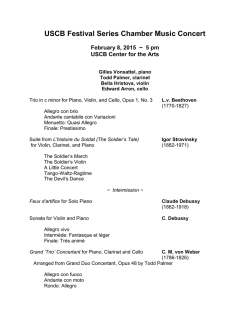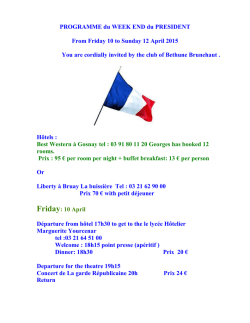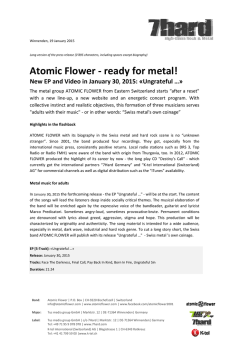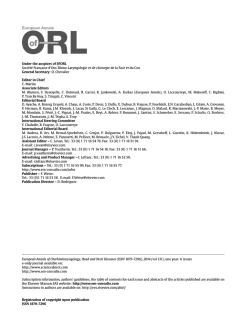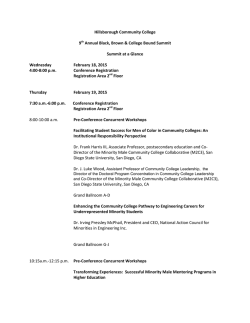
here - hudoc
issued by the Registrar of the Court ECHR 31 (2015) 28.01.2015 Grand Chamber hearing in the case of Perinçek The European Court of Human Rights is holding a Grand Chamber1 hearing today Wednesday 28 January 2015 at 9.15 a.m. in the case of Perinçek v. Switzerland (application no. 27510/08) The case concerns the criminal conviction of a Turkish politician for publicly challenging in Switzerland the existence of the Armenian genocide. The hearing will be broadcast from 2.30 p.m. on the Court’s Internet site (www.echr.coe.int). After the hearing the Court will begin its deliberations, which will be held in private. Its ruling in the case will, however, be made at a later stage. The applicant, Doğu Perinçek, is a Turkish national who was born in 1942 and lives in Ankara (Turkey). Being a doctor of laws and the Chairman of the Turkish Workers’ Party, he participated in various conferences in Switzerland in May, July and September 2005, during which he publicly denied that the Ottoman Empire had perpetrated the crime of genocide against the Armenian people in 1915 and the following years. He described the idea of an Armenian genocide as an “international lie”. The association “Switzerland- Armenia” filed a criminal complaint against him on 15 July 2005. On 9 March 2007 the Lausanne Police Court found Mr Perinçek guilty of racial discrimination within the meaning of the Article 261bis, paragraph 4 of the Swiss Criminal Code, finding that his motives were of a racist tendency and did not contribute to the historical debate. Mr Perinçek lodged an appeal that was dismissed by the Criminal Cassation Division of the Vaud Cantonal Court. In that court’s view, the Armenian genocide, like the Jewish genocide, was a proven historical fact. The courts did not therefore need to refer to the work of historians in order to accept its existence. The Federal Court dismissed a further appeal by Mr Perinçek in a judgment of 12 December 2007. Relying on Article 10 (freedom of expression) of the European Convention on Human Rights, Mr Perinçek complains that the Swiss courts breached his freedom of expression. He argues, in particular, that Article 261bis, paragraph 4, of the Swiss Criminal Code is not sufficiently foreseeable in its effect, that his conviction was not justified by the pursuit of a legitimate aim and that the alleged breach of his freedom of expression was not “necessary in a democratic society”. Procedure The application was lodged with the European Court of Human Rights on 10 June 2008. In its Chamber judgment of 17 December 2013 the Court held, by five votes to two, that there had been a violation of Article 10 of the Convention. It took the view that the grounds given by the Swiss authorities to justify Mr Perinçek’s conviction were not all pertinent and that, taken as a whole, they proved insufficient. The Court observed that the domestic authorities had not shown, in particular, that the applicant’s conviction met a “pressing social need” or that it was necessary in a democratic society for the protection of the honour and 1 Under Article 43 of the European Convention on Human Rights, within three months from the date of a Chamber judgment, any party to the case may, in exceptional cases, request that the case be referred to the 17-member Grand Chamber of the Court. In that event, a panel of five judges considers whether the case raises a serious question affecting the interpretation or application of the Convention or its protocols, or a serious issue of general importance, in which case the Grand Chamber will deliver a final judgment. If no such question or issue arises, the panel will reject the request, at which point the judgment becomes final. Otherwise Chamber judgments become final on the expiry of the three-month period or earlier if the parties declare that they do not intend to make a request to refer. feelings of the descendants of the victims of the atrocities which dated back to 1915 and the following years. The Court therefore found that the domestic authorities had overstepped the margin of appreciation afforded to them in the present case, which had arisen in the context of a debate of undeniable public interest. On 17 March 2014 the Government of Switzerland requested that the case be referred to the Grand Chamber under Article 43 (referral to the Grand Chamber) and on 2 June 2014 the panel of the Grand Chamber accepted that request. Composition of the Court The case will be heard by a Grand Chamber, composed as follows: Dean Spielmann (Luxembourg), President, Josep Casadevall (Andorra), Mark Villiger (Liechtenstein), Isabelle Berro (Monaco), Işıl Karakaş (Turkey), Ján Šikuta (Slovakia), Päivi Hirvelä (Finland), Mirjana Lazarova Trajkovska (“The former Yugoslav Republic of Macedonia”) Vincent A. de Gaetano (Malta), Angelika Nußberger (Germany), Linos-Alexandre Sicilianos (Greece), Helen Keller (Switzerland), André Potocki (France), Helena Jäderblom (Sweden), Aleš Pejchal (the Czech Republic), Faris Vehabović (Bosnia and Herzegovina), Egidijus Kūris (Lithuania), judges, Johannes Silvis (the Netherlands), Iulia Antoanella Motoc (Romania), Ledi Bianku (Albania), substitute judges, and also Erik Fribergh, Registrar. Representatives of the parties Government of Switzerland Frank Schürmann, Agent, Daniel Thürer, Counsel, Jürg Lindenmann, Adrian Scheidegger and Cordelia Ehrich, Advisers; Applicant Mehmet Cengiz and Christian Laurent Pech, Counsel, The applicant, Doğu Perinçek, will also attend the hearing. Third parties Government of Turkey Erdoğan İşcan, Agent, Stefan Talmon, Counsel, Ahmet Münci Özmen, Halime Ebru Demircan and Melike Yilmaz, Advisers; 2 Government of Armenia Gevorg Kostanyan Agent, Geoffrey Robertson QC and Amal Clooney, Counsel, Arman Tatoyan, Emil Babayan and Toby Collis, Advisers. This press release is a document produced by the Registry. It does not bind the Court. Decisions, judgments and further information about the Court can be found on www.echr.coe.int. To receive the Court’s press releases, please subscribe here: www.echr.coe.int/RSS/en or follow us on Twitter @ECHRpress. Press contacts [email protected] | tel: +33 3 90 21 42 08 Denis Lambert (tel: + 33 3 90 21 41 09) Tracey Turner-Tretz (tel: + 33 3 88 41 35 30) Céline Menu-Lange (tel: + 33 3 90 21 58 77) Nina Salomon (tel: + 33 3 90 21 49 79) The European Court of Human Rights was set up in Strasbourg by the Council of Europe Member States in 1959 to deal with alleged violations of the 1950 European Convention on Human Rights. 3
© Copyright 2026




